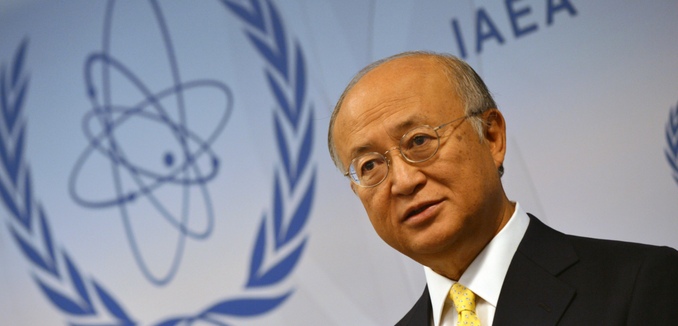Reuters revealed today the existence of an International Atomic Energy Agency (IAEA) document charging that Iran has failed to address questions about its past nuclear research.
Iran is failing to address suspicions it may have worked on designing an atomic bomb, according to the latest report by a U.N. watchdog, potentially complicating efforts by world powers to reach a deal with Tehran on its nuclear program.
The report by the International Atomic Energy Agency said Tehran had still not provided information it was due to produce more than two months ago to help advance a long-running IAEA inquiry into suspected nuclear weapons research.
The confidential document was issued to IAEA member states less than three weeks before the Nov. 24 deadline by which Iran and six global powers are seeking to end a decade-old standoff over the Islamic Republic’s atomic activities.
According to Reuters, the IAEA report said that “Iran has not provided any explanations that enable the agency to clarify the outstanding practical measures.”
The Institute for Science and International Security (ISIS) today published a preliminary reaction (.pdf) to the just-released IAEA report. ISIS addressed, in general, the IAEA’s judgment that there has been no progress in efforts to learn the extent of Iran’s past nuclear programs.
The most striking point in the just-released International Atomic Energy Agency (IAEA) quarterly Iran safeguards report is Iran’s consistent refusal to address the inspectors’ concerns that it had a well – structured nuclear weapons program prior to 2004, and that parts of that program may have continued afterwards and some may be on-going today. In particular, the report states that Iran has still not provided information regarding two areas of concern, called “practical measures” in the IAEA document, despite Iran’s commitment to do so two months ago. The report also states that no further technical discussions are planned before November 24, the deadline for the P5+1 and Iran to negotiate a long – term nuclear agreement. By failing to address the IAEA’s concerns, Iran is complicating, and even threatening, the achievement of a long term nuclear deal. The United States and its allies have repeatedly stated that Iran must demonstrate concrete progress on addressing the IAEA’s concerns.Unless Iran takes some measures soon, any deal that could be reached will likely need to link any significant economic or financial sanctions relief to Iran addressing the IAEA concerns about Iran’s military nuclear programs and nuclear weapon related activities, some of which may be on-going.
The IAEA’s language in this report reads more negatively than previous quarterly reports, signaling that Iran is not cooperating on this key issue and appears unwilling to settle it.
The ISIS reaction also mentioned a specific example of Iran’s refusal to cooperate:
The visa for one member of the IAEA team to visit Iran for the technical meeting in Tehran in October 2014 was not issued. This is the 4th occasion on which this staff member has been unable to participate in technical meetings in Tehran as a result of Iran not issuing a visa.
In a commentary written earlier this week (.pdf), David Albright, the president of ISIS, and Ollie Heinonen, a former IAEA inspector, warned that because “concrete progress is needed on the central issue of whether Iran has worked on nuclear weapons and is maintaining a capability to revive such efforts in the future … signing a deal without Iran demonstrating that it is turning its back on nuclear weapons is folly. Iran would have shown that stonewalling can pay off in the long run; surviving a punishing sanctions regime is only a temporary plight.”
About ten years ago, Hassan Rouhani, who is now president of Iran but at the time had just stepped down as the country’s nuclear negotiator, said in a speech, “Having fuel cycle capability almost means that the country that possesses this capability is able to produce nuclear weapons, should that country have the political will to do so.” If Iran has developed the technical knowledge to take enriched uranium and make it into a bomb, Iran will have the capability to produce a nuclear weapon, possibly even before it could be detected.
[Photo: IAEA Imagebank / Flickr ]




